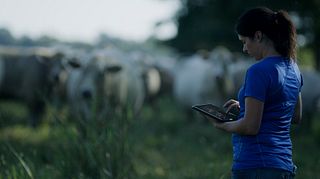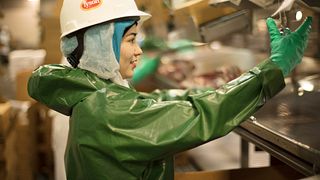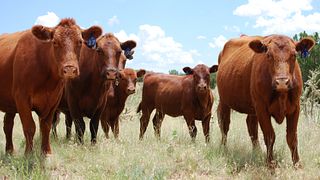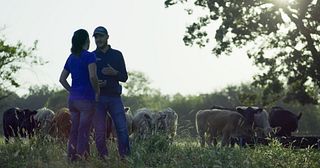Beef Quality Assurance
why bqa certification?
Montana’s Beef Quality Assurance (BQA) Certification program seeks to improve the competitiveness and profitability of Montana beef producers and build consumer trust in the industry to expand markets for beef products in the retail and foodservice industries.
BQA certification documents education and implementation of “commonsense husbandry techniques and scientific knowledge that demonstrate commitment to animal welfare, food safety and quality, safeguard the public image of beef industries, and uphold consumer confidence in beef.” Daniel Buskirk, PhD, Cattle Buyers to Require BQA Certification (Angus Beef Bulletin Extra. September 20, 2018, Vol 11: No. 9).
For the future of Montana’s beef industry, the BQA certified producer and BQA-Transportation certified transporters will lead the way to safeguarding, sustaining, and expanding the market share and profitability for Montana’s beef products.

MontanaNS HAVE SPOKEN
Consumers want to know more about where their food comes from. Data from a 2019 National Cattlemen's Beef Association survey suggests that Montanans are interested and have opinions about the beef industry that can influence their decisions about buying and consuming beef.
Of consumers surveyed, 42% agree that beef farmers/ranchers embrace innovation to improve quality and safety of the products and that beef producers do a good job balancing economic, social, and environmental issues that are important to consumers. BQA certification documents and formalizes the standards for quality, transparency, and safety of products and improves consumer trust.

INDUSTRY PARTNERS HAVE SPOKEN
Increasingly, processors and foodservice industries are demanding BQA certification from sources of beef products and transportation. To receive full market value for beef, whether directly to processors or through auction markets, may require BQA certification. We learned via the NDSU Extension - Dickey County, NDSU 2 U Blog that:- In 2019, Tyson Foods and Cargill protein required that all beef purchased come from BQA certified producers.
- In 2020, Tyson Foods harvest facilities require BQA Transportation certification.
- Other industry partners requiring BQA certification of producers: JBS, Cargill, and Greater Omaha.
- Wendy’s requires all beef purchases to be from BQA certified farms and ranches.

it's in the numbers
With the question in mind of how BQA certification impacts profitability, Colorado State University evaluated the effect of just mentioning BQA certifications in an auction on the sale price across nine western states. What they found was impressive: a premium of $16.80 per head of cattle was realized. This suggests that there is a significant benefit for Montana beef producers to become involved and certified through the Montana BQA Certification program.
how does it work?
The Montana BQA Certification program aligns with the national BQA program to provide online training and certification. Once you are certified, your certification is valid for a period of three years. As the expiration date nears, a notification will be sent to you with information on how to get recertified.
Online
Online BQA certification training is fast and easy and can be completed according to your own personal schedule. Your certification is housed in the national database and is recognized across the country. Information on online BQA certification training is available through the national BQA website.
MEET BQA RECOGNIZED Montana RANCHERS
The IX Ranch covers over 126,000 acres and is located south-east of Big Sandy, MT in the mixed grass prairie of north central Montana and extends through the southern edge of the Bear Paw mountain range and east towards the Missouri River. The 4,300 head operation is run by the Roth family, just the second owners in the ranch’s 128-year history.Shining the spotlight on Montana, the IX Ranch continues the tradition of quality cattle care by doing the right thing and was awarded as the 2020 BQA Cow/Calf of the Year Ranch.
MEET BQA RECOGNIZED Montana RANCHERS
For the past 20 years, Curt Pate has conducted demonstrations and clinics on BQA, cattle handling, and stockmanship. His skill in conducting stockmanship demonstrations coupled with his effective communication and ability to establish immediate trust and camaraderie with his audiences have made him a sought-after clinician, both on the national and international level.Montana-based BQA Educator of the Year Curt Pate is a pioneer in the world of stockmanship and cattle handling, and has shared his knowledge and dairy producers, animal husbandry experts, feedlot operations, students, 4-H and FFA members, horse trainers, and many others across the globe.
Chefs experience BQA standards in practice
The journey to deliver high-quality and safe beef requires collaboration from pasture to plate. At each step of the process—from the beef farmers and ranchers who raise beef and abide by Beef Quality Assurance standards to the chefs and restauranteurs who prepare beef in their restaurants there is a strong commitment to delivering high-quality beef that consumers love.
That’s why Beef. It’s What’s For Dinner. in partnership with Chef’s Roll, brought beef farmers and ranchers together with chefs in Idaho, Arizona, Oklahoma, Georgia and California. This video series takes chefs across the beef lifecycle to get a first-hand look at the care that goes into creating high-quality beef. But the journey for quality beef doesn’t stop at the farm or ranch.
Each video follows a chef as they visit a local cattle operation to learn about how BQA practices are used to sustainably and responsibly raise high-quality beef. The beef farmer or rancher then visits the chef’s kitchen to gain an understand of how beef is prepared and featured on the chef’s menu. The experience is rounded out with a shared beef meal.
Idaho Rancher Kim Brackett explains that prioritizing animal welfare is the right and only way to ensure quality beef, and Executive Chef Shawn Smith of Coynes Restaurant shares his "Butler Steak Risotto" with flatiron steak.
montana ffa contest
brought to you by the Montana beef council
Montana FFA beef quality assurance contest
All Montana agriculture classrooms are eligible to compete in the BQA contest to win money for their local FFA chapter. The contest will be open from November 1 to April 1 each year.
Step 1: SIGN UP ONLINE
Visit the BQA Learning Center where each student will create their own unique account using their personal email address. Be sure to enter the SCHOOL NAME to be counted! See the special note below for specific instructions.
Step 2: COMPLETE THE CERTIFICATION
Follow along and complete the online modules to receive Montana Beef Quality Assurance certification.
Step 3: WIN
The school chapter with the most BQA certifications will receive $500 and second place will receive $250 from the Montana Beef Council.
There will be TWO (2) categories of winners with a first and second place awarded in each category. The small school division will be made up of Montana Class B and C schools that will compete against each other. The large school division will be made up of Class A and AA schools that will compete against each other. The pure number of BQA certifications gained between November 1 and April 1 will determine the winning chapters.
*Special Note- Students will need to create their own personal account on the BQA online learning center. We have three courses available; students will only need to take ONE of the courses to become certified. (We recommend not taking all three courses as they are very similar and will be repetitive for students.) Students can create an account with their school email address, however, you will need to make sure your school IT department is aware of our email domain so that our confirmation email and certification email come through. Our email domain is [email protected] We recommend that students use their own personal email address so that they can get these emails. Make sure students fill out the COMPANY/SCHOOL/FARM/RANCH NAME as that is what we will use to be able to get you all the correct information and make sure we’re not missing anyone in each chapter.
